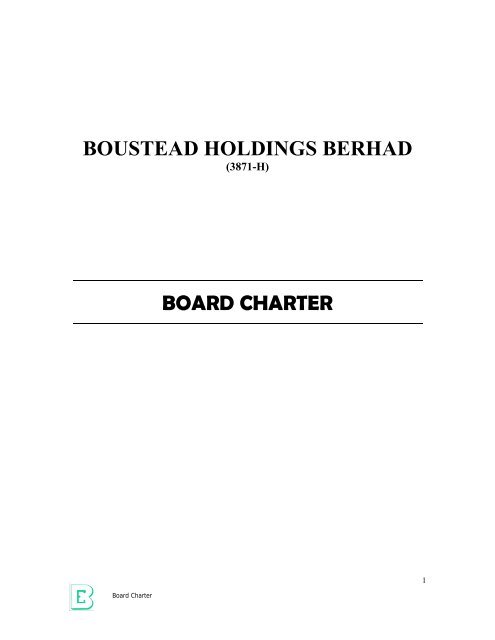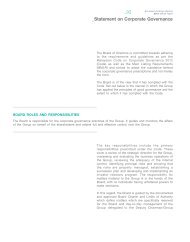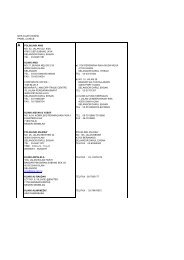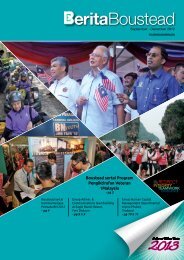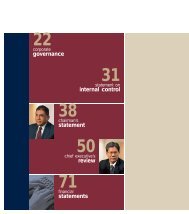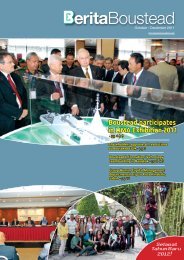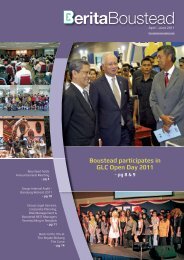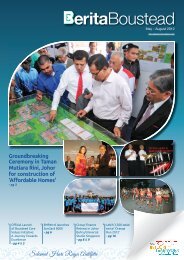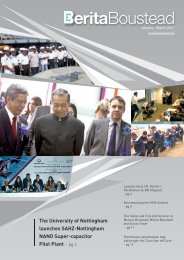THE BOARD - Boustead Holdings Berhad
THE BOARD - Boustead Holdings Berhad
THE BOARD - Boustead Holdings Berhad
Create successful ePaper yourself
Turn your PDF publications into a flip-book with our unique Google optimized e-Paper software.
BOUSTEAD HOLDINGS BERHAD<br />
(3871-H)<br />
<strong>BOARD</strong> CHARTER<br />
1<br />
Board Charter
BOUSTEAD HOLDINGS BERHAD<br />
(3871-H)<br />
<strong>BOARD</strong> CHARTER<br />
1. INTRODUCTION<br />
The Directors of <strong>Boustead</strong> <strong>Holdings</strong> <strong>Berhad</strong> (BHB) regard Corporate Governance<br />
as vitally important to the success of BHB's business and are unreservedly<br />
committed to applying the principles necessary to ensure that the following<br />
principles of good governance is practised in all of its business dealings in<br />
respect of its shareholders and relevant stakeholders:<br />
• The Board is the focal point of the Company’s Corporate Governance<br />
system. It is ultimately accountable and responsible for the performance<br />
and affairs of the Company.<br />
• All Board members are expected to act in a professional manner, thereby<br />
upholding the core values of integrity and enterprise with due regard to<br />
their fiduciary duties and responsibilities.<br />
• All Board members are responsible to the Company for achieving a high<br />
level of good governance.<br />
• This Board Charter shall constitute, and form, an integral part of each<br />
Director’s duties and responsibilities.<br />
2. OBJECTIVES<br />
The objectives of this Board Charter are to ensure that all Board members<br />
acting on behalf of the Company are aware of their duties and responsibilities<br />
as Board members and the various legislations and regulations affecting their<br />
conduct and that the principles and practices of good Corporate Governance are<br />
applied in all their dealings in respect, and on behalf of, the Company.<br />
In pursuit of the ideals in this Board Charter, the intention is to exceed<br />
"minimum legal requirements" with due consideration to recognised standards<br />
of best practices locally and internationally.<br />
Board Charter<br />
2
Clause<br />
Reference<br />
3. <strong>THE</strong> <strong>BOARD</strong><br />
3.1 Role<br />
3.1.1 The Board assumes the duty of leading and managing the<br />
Company in an effective and responsible manner. Each Director<br />
takes on the legal duty to act in the best interest of the Company.<br />
The Directors, collectively and individually, are aware of their<br />
responsibilities to shareholders and stakeholders for the manner in<br />
which the affairs of the Company are managed. The Board sets the<br />
Company’s values and standards and ensures that its obligations<br />
to its shareholders and stakeholders are understood and met.<br />
3.1.2 The Board understands that the responsibility for good Corporate<br />
Governance rests with the Board and therefore strives to follow the<br />
principles and best practices stated in the MCCG. The Board<br />
includes a narrative statement in its Company’s Annual Report on<br />
the extent of compliance with the principles and best practices in<br />
Corporate Governance pursuant to the LR.<br />
MCCG<br />
Part 1 A1<br />
CC<br />
Para A.1<br />
LR<br />
Para 15.26<br />
3.1.3 The Company complies with the various guidelines issued by Bursa<br />
Securities and the SC relating to disclosure and internal audit<br />
functions.<br />
3.1.4 The Board meets in person at least once every quarter to facilitate<br />
the discharge of their responsibilities. Members of the Management<br />
who are not Directors may be invited to attend and speak at<br />
meetings on matters relating to their sphere of responsibility.<br />
MCCG<br />
Part 4 AA XIV<br />
3.1.5 Duties of the Board include establishing the corporate vision and<br />
mission, as well as the philosophy of the Company, setting the<br />
aims of the Management and monitoring the performance of the<br />
Management.<br />
3.1.6 The Board assumes the following specific duties:<br />
a) Establishing and reviewing the strategic direction of the<br />
Company;<br />
MCCG<br />
Part 2 AA1<br />
b) Overseeing and evaluating the conduct of the Company’s<br />
businesses;<br />
c) Reviewing the adequacy of the internal control policy;<br />
d) Identifying principal risks and ensuring that the risks are<br />
properly managed;<br />
e) Establishing a succession plan; and<br />
3<br />
Board Charter
Clause<br />
Reference<br />
f) Developing and implementing an investors relations<br />
programme or shareholder communication policy.<br />
3.1.7 Generally, a director’s responsibilities include:<br />
a) To be aware of the Group’s operating environment and<br />
promote safely and soundness of the Group;<br />
b) To be diligent in undertaking his duties and avoid conflict of<br />
interest situation;<br />
c) To understand his oversight role and exercise independent<br />
judgment in decision making;<br />
d) To devote adequate time and attention to discharge his<br />
duties and responsibility effectively; and<br />
e) To contribute actively to the functions of the board and be<br />
able to provide sound and objective advice.<br />
3.1.8 The Board has established procedures determining which issues<br />
require a decision of the full Board and which issues can be<br />
delegated to Board Committees or the Management.<br />
3.1.9 The Board reserves full decision-making powers on the following<br />
matters:<br />
MCCG<br />
Part 4 AA XV<br />
MCCG<br />
Part 4 4.45<br />
a) Conflict of interest issues relating to a substantial shareholder<br />
or a Director;<br />
b) Material acquisitions and disposition of assets not in the<br />
ordinary course of business;<br />
c) Investments in Capital projects;<br />
d) Authority levels;<br />
e) Treasury policies;<br />
f) Risk management policies; and<br />
g) Key human resource issues.<br />
3.1.10 The Board has a policy whereby the Directors, collectively or<br />
individually, may seek independent professional advice in<br />
furtherance of their duties at the Company’s expense.<br />
MCCG<br />
Part 4 AA XX<br />
LR<br />
Para 15.04<br />
4<br />
Board Charter
Clause<br />
Reference<br />
3.2 Composition and Board Balance<br />
3.2.1 The Board consists of qualified individuals with diverse<br />
experiences, backgrounds and perspectives. The composition and<br />
size of the Board is such that it facilitates the making of informed<br />
and critical decisions.<br />
3.2.2 At any one time, at least two (2) or one-third (1/3), whichever is<br />
higher, of the Board members are Independent Directors.<br />
3.2.3 Profiles of Board members are included in the Annual Report of the<br />
Company.<br />
3.2.4 The Chief Executive Officer (CEO) and the Executive Director(s)<br />
are the “Executive” Directors on the Board. However, the views of<br />
the Management are represented at meetings of the Board by the<br />
presence of senior executives when required.<br />
3.2.5 Non-Executive Directors meet as a group at least once a year<br />
without the Chairman or Executive Directors present. There is a<br />
statement in the Annual Report on whether the Non-Executive<br />
Directors have met without the Chairman or Executives Directors<br />
being present, during the meeting with External Auditors.<br />
MCCG<br />
Part 4 AA XII<br />
M&A<br />
LR<br />
Para 15.02<br />
M&A<br />
MCCG<br />
Part 2 AA VI<br />
Bursa<br />
Malaysia<br />
MCCG<br />
M&A<br />
Higgs Report<br />
Para 8.8<br />
3.2.6 The Independent Directors provide independent judgement,<br />
experience and objectivity without being subordinated to<br />
operational considerations.<br />
3.2.7 The Independent Directors help to ensure that the interests of all<br />
shareholders, and not only the interests of a particular fraction or<br />
group, are indeed taken into account by the Board and that the<br />
relevant issues are subjected to objective and impartial<br />
consideration by the Board.<br />
3.2.8 The views of the Independent Directors should carry significant<br />
weight in the Board's decision-making process.<br />
3.2.9 The Board may appoint a Senior Independent Director to whom<br />
shareholders’ concerns can be conveyed. The Senior Independent<br />
Director chairs the meetings between the Non-Executive Directors<br />
where both the Chairman and Executive Directors do not attend.<br />
MCCG<br />
Part 4 AA VII<br />
Higgs Report<br />
Para 7.5<br />
3.2.10 If, on any matter discussed at a Board meeting, any Director holds<br />
views contrary to those of any of the other Directors, the Board<br />
minutes will clearly reflect this.<br />
5<br />
Board Charter
Clause<br />
Reference<br />
3.2.11<br />
3.2.12<br />
3.2.13<br />
3.2.14<br />
3.2.15<br />
3.2.16<br />
3.2.17<br />
3.2.18<br />
The number of Directors’ (including the MD) should not be less<br />
than 2 nor more than 15.<br />
A Director may appoint (and also remove) any person not already<br />
a Director of the Company, to be an alternate Director.<br />
At least 1/3 of the Directors are subject to retirement by rotation<br />
at every AGM.<br />
BHB is not subject to any shareholders’ agreement and hence the<br />
Board Composition of BHB is not governed by any Shareholders’<br />
Agreement. However, certain group subsidiaries which are jointventures<br />
between BHB with other parties would be subject to<br />
shareholders’ or joint-venture agreement. Hence, the Composition<br />
of the Boards of these subsidiaries would be governed by the<br />
shareholders’ or joint-venture agreements.<br />
An undischarged bankrupt is prohibited from acting as a director.<br />
No person over 70 years of age shall be appointed as a Director.<br />
However, the Company at an AGM passed by a majority of not less<br />
than ¾ of members entitled to vote, may appoint or re-appoint<br />
such director to hold office until the conclusion of the next AGM.<br />
Directors who have been convicted, are prohibited from acting as a<br />
director within 5 years of conviction or release from imprisonment,<br />
without leave of the Court.<br />
A person who had acted as a director of an insolvent company<br />
which has gone into liquidation is prohibited from acting as director<br />
of the Company within 5 years from the date of a Court order.<br />
CA S122(1)<br />
Article 96<br />
M&A<br />
Article 101<br />
M&A<br />
Article 105<br />
M&A<br />
CA S125<br />
CA S129(1)<br />
& (6)<br />
CA S130<br />
CA S130(A)<br />
3.3 Appointments<br />
3.3.1 The appointment of a new Director is a matter for consideration<br />
and decision by the full Board upon appropriate recommendation<br />
from the Nominating Committee.<br />
MCCG<br />
Part 4 AA<br />
VIII<br />
3.3.2 New Directors are expected to have such expertise so as to qualify<br />
them to make a positive contribution to the Board performance of<br />
its duties and to give sufficient time and attention to the affairs of<br />
the Company.<br />
3.3.3 The Company Secretary has the responsibility of ensuring that<br />
relevant procedures relating to the appointments of new Directors<br />
are properly executed.<br />
MCCG<br />
Part 2 AA XI<br />
6<br />
Board Charter
Clause<br />
3.3.4 The Company has adopted an induction programme for newly<br />
appointed Directors. The induction programme aims at<br />
communicating to the newly appointed Directors, the Company’s<br />
vision and mission, its philosophy and nature of business, current<br />
issues within the Company, the corporate strategy and the<br />
expectations of the Company concerning input from Directors. The<br />
Chairman is primarily responsible for the induction programme<br />
with appropriate assistance from other senior Executive Directors.<br />
3.3.5 The Company has adopted educational / training programmes to<br />
update the Board in relation to new developments pertaining to<br />
the laws and regulations and changing commercial risks which may<br />
affect the Board and/or the Company.<br />
3.3.6 In addition to the Mandatory Accredited Programme (MAP) as<br />
required by the Bursa Securities, Board members are also<br />
encouraged to attend training programmes conducted by highly<br />
competent professionals and which are relevant to the Company’s<br />
operations and business. The Board will assess the training needs<br />
of the Directors and disclose in the Annual Report the trainings<br />
attended by the Directors.<br />
3.3.7 The directorships held by any Board member at any one time shall<br />
not exceed ten (10) in listed companies and fifteen (15) in nonlisted<br />
companies.<br />
Reference<br />
MCCG<br />
Part 2 AA XII<br />
Higgs Report<br />
Para 11.4<br />
Higgs Report<br />
Para<br />
11.6–11.18<br />
MCCG<br />
Part 4 4.41<br />
LR<br />
Para 15.09<br />
Higgs Report<br />
Para<br />
11.6–11.18<br />
LR<br />
Para 15.06<br />
3.4 Re-election<br />
3.4.1<br />
3.4.2<br />
All Directors are subject to retirement by rotation.<br />
At least 1/3 of the Directors are subject to retirement by rotation<br />
at the Company AGM.<br />
LR<br />
Para 7.28<br />
Article 105<br />
M&A<br />
3.5 Supply of Information<br />
3.5.1 All Directors are provided with timely and quality information and<br />
in a form and manner appropriate for them to discharge their<br />
duties effectively.<br />
3.5.2 The Management is responsible for providing the Board with the<br />
required information in an appropriate and timely manner. The<br />
Chairman, assisted by the Company Secretary, assesses the type<br />
of information required to be provided to the Board. If the<br />
information provided by the Management is insufficient, the Board<br />
will make further enquiries where necessary to which the persons<br />
responsible will respond as fully and promptly as possible.<br />
MCCG<br />
Part 1 A III<br />
Higgs Report<br />
Para 11.26<br />
7<br />
Board Charter
Clause<br />
3.5.3 A full agenda and comprehensive Board papers are circulated to all<br />
Directors well in advance of each Board meeting.<br />
Reference<br />
Higgs Report<br />
Para 11.25<br />
3.5.4 Amongst others, the Board papers include the following:<br />
a) Quarterly financial report and report on the Company’s cash<br />
and borrowing positions;<br />
b) Minutes of meetings of all Committees of the Board;<br />
c) A current review of the operations of the Company;<br />
d) Reports on Related Party Transactions and Recurrent Related<br />
Party Transactions;<br />
e) Directors’ share-dealings, including public shareholdings<br />
spread; and<br />
f) Annual Management Plans.<br />
3.5.6 Full Board minutes of each Board meeting are kept by the<br />
Company Secretary and are available for inspection by any<br />
Director during office hours.<br />
4. CHAIRMAN AND CHIEF EXECUTIVE OFFICER (CEO)<br />
The Board aims to ensure a balance of power and authority<br />
between the Chairman and the CEO with a clear division of<br />
responsibility between the running of the Board and the<br />
Company's business respectively. The positions of Chairman (ie.<br />
Non-Executive Chairman) and CEO are separated and clearly<br />
defined.<br />
Higgs Report<br />
Para 5.3<br />
MCCG<br />
Part 4 II<br />
4.1 Chairman<br />
4.1.1 The Chairman is responsible for leadership of the Board in ensuring<br />
the effectiveness of all aspects of its role. The Chairman is<br />
responsible for:<br />
Higgs Report<br />
Para 5.2<br />
a) leading the Board in setting the values and standards of the<br />
Company;<br />
b) maintaining a relationship of trust with and between the<br />
Executive and Non-Executive Directors;<br />
c) ensuring the provision of accurate, timely and clear<br />
information to Directors;<br />
8<br />
Board Charter
Clause<br />
Reference<br />
d) ensuring effective communication with shareholders and<br />
relevant stakeholders;<br />
e) arranging regular evaluation of the performance of the Board,<br />
its Committees and individual Directors;<br />
f) facilitating the effective contribution of Non-Executive<br />
Directors and ensuring constructive relations be maintained<br />
between Executive and Non-Executive Directors.<br />
4.1.2 The Chairman, in consultation with the CEO and the Company<br />
Secretary, sets the agenda for Board meetings and ensures that all<br />
relevant issues are on the agenda.<br />
MCCG<br />
Part 4 4.19<br />
4.1.3 The Chairman is responsible for managing the business of the<br />
Board to ensure that:<br />
• all Directors are properly briefed on issues arising at Board<br />
meetings.<br />
• sufficient time is allowed for the discussion of complex or<br />
contentious issues and, where appropriate, arranging for<br />
informal meetings beforehand to enable thorough<br />
preparation for the Board discussion.<br />
• the issues discussed are forward looking and concentrates<br />
on strategy.<br />
4.1.4 The Chairman ensures that every Board resolution is put to vote to<br />
ensure the will of the majority prevails.<br />
4.1.5 The Chairman ensures that Executive Directors look beyond their<br />
executive functions and accept their full share of responsibilities on<br />
governance.<br />
4.1.6 The Chairman will have no casting vote if two (2) Directors form a<br />
quorum, or if there are only two (2) Directors competent to vote<br />
on the question at issue.<br />
Higgs Report<br />
Para 5.12<br />
Higgs Report<br />
Para 5.11<br />
MCCG<br />
Part 4 4.21<br />
MCCG<br />
Part 4 4.19<br />
LR<br />
Para 7.34<br />
A copy of the Directors’ Code of Ethics is attached hereto on<br />
Appendix A.<br />
4.2 Group Managing Director (GMD)/Chief Executive Officer<br />
(CEO)<br />
4.2.1 The GMD/CEO is the conduit between the Board and the<br />
Management in ensuring the success of the Company’s governance<br />
and management functions.<br />
9<br />
Board Charter
Clause<br />
Reference<br />
4.2.2 The GMD/CEO has the executive responsibility for the day-to-day<br />
operation of the Company's business.<br />
4.2.3 All Board authorities conferred on the Management is delegated<br />
through the GMD/CEO and this will be considered as the<br />
GMD’s/CEO’s authority and accountability as far as the Board is<br />
concerned.<br />
4.2.4 The key role of the GMD/CEO, amongst others, include:<br />
a) developing the strategic direction of the Group;<br />
b) ensuring that the Group’s strategies and corporate policies<br />
are effectively implemented;<br />
c) ensuring that Board decisions are implemented and Board<br />
directions are adhered to;<br />
d) providing directions in the implementation of short and long<br />
term business plans;<br />
e) providing strong leadership i.e. effectively communicating a<br />
vision, management philosophy and business strategy to the<br />
employees;<br />
f) keeping Board fully informed of all important aspects of the<br />
Group’s operations and ensuring sufficient information is<br />
distributed to the board members;<br />
g) ensuring high performance and productivity of top<br />
management staff by creating conditions for top<br />
management motivation, performance management and<br />
professional development;<br />
h) ensuring compliance with all relevant legislation and<br />
regulations by reviewing policies and monitoring compliance;<br />
i) developing and maintaining effective relations with significant<br />
external agencies, investing public and other trade<br />
associations and institutions; and<br />
j) ensuring day-to-day business affairs of the Group are<br />
effectively managed.<br />
4.2.5 The Board may time to time appoint any one (1) or more of their<br />
body to be the MD. Any such appointment shall be for such period<br />
not exceeding 3 years subject to reappointment and on such terms<br />
as the Directors think fit.<br />
Article 126<br />
M&A<br />
10<br />
Board Charter
Clause<br />
4.2.6 The GMD/CEO shall be subject to retirement by rotation, and<br />
subject to the provisions of any contract between him and the<br />
Company, be subject to the same provisions as to resignations and<br />
removal as the other Directors, and if he ceases from any cause to<br />
be a Director shall ipso facto and immediately cease to be<br />
Managing Director.<br />
4.2.7 The MD shall be subject to the control of the Board who may<br />
entrust to and confer him any of the powers exercisable by them<br />
as Directors upon such terms and conditions and with such<br />
restrictions as they may think fit and, either concurrently<br />
Reference<br />
Article 128<br />
M&A<br />
Article 129<br />
M&A<br />
5. <strong>BOARD</strong> COMMITTEES<br />
The Board appoints the following Board Committees with specific<br />
terms of reference:<br />
• Audit Committee<br />
• Nominating Committee<br />
• Remuneration Committee<br />
Higgs Report<br />
13.1<br />
Independent and Non-Executive Directors play a leading role in<br />
these Committees. The Management and third parties are coopted<br />
to the Committees as and when required. Details of the<br />
membership and a summary of the terms of reference of each<br />
Committee appointed by the Board are published in the Annual<br />
Report.<br />
The Directors may establish any committees, local boards or<br />
agencies for managing any of the affairs of the Company, either in<br />
Malaysia or elsewhere, may lay down, vary and annul such rules<br />
and regulations as they may think fit for the conduct of the<br />
business thereof, and may appoint any person to be members of<br />
any such committee or local board, or any managers or agents,<br />
may fix their remuneration, and may delegate to any such<br />
committee, local board, manager or agent any of the powers,<br />
authorities and discretions vested in the Directors with power to<br />
sub-delegate, and may authorise the members of any such<br />
committee or local board, or any of them, to fill any vacancies<br />
therein, and to act notwithstanding vacancies and any such<br />
appointment or delegation may be made upon such terms and<br />
subject to such conditions as the Directors may think fit. The<br />
Directors may remove any person so appointed, and may annul or<br />
vary any such delegation, but no person dealing in good faith and<br />
without notice of such annulment or variation shall be affected<br />
thereby.<br />
Article 141<br />
M&A<br />
11<br />
Board Charter
Clause<br />
Reference<br />
5.1 Audit Committee<br />
5.1.1 The Audit Committee comprises at least three (3) members, a<br />
majority of whom are Independent Directors.<br />
5.1.2 No alternate Director can be appointed as a member of the Audit<br />
Committee.<br />
5.1.3 The Audit Committee will elect an Independent Director from<br />
amongst them as its Chairman.<br />
LR<br />
Para 15.10<br />
LR<br />
Para 15.10<br />
LR<br />
Para 15.11<br />
5.1.4 The functions of the Audit Committee are to review the following<br />
and report the same to the Board:<br />
LR<br />
Para 15.13<br />
a) with the external Auditor, the audit plan;<br />
b) with the external Auditor, his evaluation of the system of<br />
internal controls;<br />
c) with the external Auditor, his audit report;<br />
d) the assistance given by the employees of the Company to the<br />
external Auditor;<br />
e) the adequacy of the scope, functions and resources of the<br />
internal audit functions and that it has the necessary authority<br />
to carry out its work;<br />
f) the internal audit programme, processes, the results of the<br />
internal audit programme, processes or investigation<br />
undertaken and whether or not appropriate action is taken on<br />
the recommendations of the internal audit functions<br />
g) the quarterly results and year end financial statements, prior<br />
to the approval by the Board of Directors, focusing particularly<br />
on:<br />
(i)<br />
(ii)<br />
(iii)<br />
changes in or implementation of major accounting<br />
policy changes;<br />
significant and unusual events; and<br />
compliance with accounting standards and other legal<br />
requirements;<br />
h) any related party transaction and conflict of interest situation<br />
that may arise within the Company or group including any<br />
transaction, procedure or course of conduct that raises<br />
questions of management integrity;<br />
12<br />
Board Charter
Clause<br />
Reference<br />
i) any letter of resignation from the external Auditor of the<br />
Company; and<br />
j) whether there is reason (supported by grounds) to believe<br />
that the Company’s external Auditor is not suitable for reappointment.<br />
5.1.5 The Audit Committee meets on a quarterly basis to carry out its<br />
functions. The Audit Committee is also responsible for<br />
recommending the person or persons to be nominated to act as<br />
the external Auditor and the remuneration and terms of<br />
engagement of the external Auditor.<br />
5.1.6 The CEO, General Manager, Head of Internal Audit and the<br />
Financial Controller may attend the meetings only at the invitation<br />
of the Audit Committee.<br />
5.1.7 The Board will review the performance of the Audit Committee<br />
once in every three (3) years.<br />
LR<br />
Para 15.13<br />
LR<br />
Para 15.14<br />
LR<br />
Para 15.21<br />
Terms and Reference of the Audit Committee is attached hereto as<br />
Appendix B.<br />
5.2 Nominating Committee<br />
5.2.1 The Nominating Committee comprises Non-Executive Directors and<br />
a majority of the Committee members are appointed from the<br />
Independent Directors.<br />
MCCG<br />
Part 4 AA<br />
VIII<br />
5.2.2 The Nominating Committee will elect an Independent Director from<br />
amongst them as its Chairman.<br />
5.2.3 The Nominating Committee’s primary responsibilities include:<br />
a) leading the process for Board appointments and making<br />
recommendations to the Board.<br />
MCCG<br />
Part 4 4.34<br />
b) assessing Directors on an on-going basis.<br />
c) annually reviewing the required skills and core competencies<br />
of Non-Executive Directors, including familiarization with the<br />
Company’s operations.<br />
5.2.4 Duties<br />
The Nominating Committee will:<br />
Higgs Report<br />
/ ICSA<br />
Annex F<br />
a) Be responsible for identifying and nominating for the approval<br />
13<br />
Board Charter
Clause<br />
of the Board, candidates to fill Board vacancies as and when<br />
they arise.<br />
b) Evaluate the balance of skills, knowledge and experience on<br />
the Board and, in the light of this evaluation, prepare a<br />
description of the role and capabilities required for a particular<br />
appointment of Director.<br />
c) Review the time required from a Non-Executive Director. The<br />
performance evaluation should be used to assess whether the<br />
Non-Executive Director is spending enough time to fulfil their<br />
duties.<br />
d) Consider candidates from a wide range of backgrounds and<br />
look beyond the “usual suspects”.<br />
e) Give full consideration to succession planning in the course of<br />
its work, taking into account the challenges and opportunities<br />
facing the Company and what skills and expertise are needed<br />
on the Board in the future.<br />
f) Regularly review the structure, size and composition (including<br />
the skills, knowledge and experience) of the Board and make<br />
recommendations to the Board with regard to any changes.<br />
g) Keep under review the leadership needs of the organisation,<br />
both executive and non-executive, with a view to ensuring the<br />
continued ability of the organisation to compete effectively in<br />
the marketplace.<br />
h) Make a statement in the annual report about its activities; the<br />
process used for appointments and explain if external advice<br />
or open advertising has not been used; the membership of the<br />
Committee, number of Committee meetings and attendance of<br />
members over the course of the year.<br />
i) Ensure that on appointment to the Board, Non-Executive<br />
Directors receive a formal letter of appointment setting out<br />
clearly what is expected of them in terms of time commitment,<br />
Committee service and involvement outside Board meetings.<br />
Reference<br />
5.2.5 The Committee will make the following recommendations to the<br />
Board:<br />
• As regards plans for succession for Directors and Senior<br />
Management to maintain an appropriate balance of skills on<br />
the Board;<br />
Higgs Report<br />
/ ICSA<br />
Annex F<br />
Higgs Report<br />
Para 10.14<br />
• As regards the re-appointment of any Non-Executive Director<br />
at the conclusion of their specified term of office;<br />
14<br />
Board Charter
Clause<br />
Reference<br />
• Concerning the re-election by shareholders of any Director<br />
under the retirement by rotation provisions in the Company’s<br />
articles of association;<br />
• Concerning any matters relating to the continuation in office of<br />
any Director at any time; and<br />
• Concerning the appointment of any Director to executive or<br />
other office other than to the positions of Chairman and Chief<br />
Executive, the recommendation for which would be considered<br />
at a meeting of the Board.<br />
5.2.6 In the event that the Board appoints a new Chairman, the<br />
Nominating Committee will be guided by the following principles<br />
prior to making recommendations to the Board:<br />
Higgs Report<br />
Para 10.35<br />
a) That the Senior Independent Director leads the appointment<br />
process.<br />
b) That a systematic evaluation be undertaken to identify the<br />
skills and expertise required for the role.<br />
c) That all short listed candidates be considered with the<br />
possibility of obtaining external advice, if necessary.<br />
5.3 Remuneration Committee<br />
5.3.1 The Remuneration Committee comprises Non-Executive Directors<br />
and a majority of the Committee members are appointed from<br />
amongst the Independent Non-Executive Directors.<br />
MCCG<br />
Part 2 XXIV<br />
5.3.2 The Remuneration Committee will elect an Independent Non-<br />
Executive Director from amongst them as its Chairman.<br />
5.3.3 The Remuneration Committee’s primary responsibilities includes<br />
establishing, reviewing and recommending to the Board the<br />
remuneration packages of each individual Executive Directors, the<br />
Executive Chairman and the Company Secretary.<br />
Higgs Report<br />
Annex E<br />
MCCG<br />
Part 4 B XXIV<br />
5.3.4<br />
5.3.5<br />
The Remuneration Committee is also responsible for<br />
recommending the remuneration for the Senior Management and<br />
that the remuneration should reflect the responsibility and<br />
commitment that goes with it.<br />
The fees of the Directors shall from time to time be determined by<br />
an ordinary resolution of the Company in general meeting but the<br />
remuneration of the executive directors shall from time to time be<br />
determined by the Board. The fees payable to Directors shall not<br />
Board Charter<br />
Higgs Report<br />
Para 13.10<br />
Article 98 of<br />
M&A<br />
15
Clause<br />
be increased except pursuant to a resolution passed at general<br />
meeting when notice of the proposed increase has been given in<br />
the notice convening the meeting. The fees payable to nonexecutive<br />
Directors shall be a fixed sum and not by a commission<br />
on or percentage of profits or turnover and be divisible among the<br />
Directors as they may agree, or failing agreement, equally, except<br />
that any Director holding office for part only of a year shall be<br />
entitled to a proportionate part of a full year’s remuneration.<br />
Reference<br />
6. REMUNERATION LEVELS OF DIRECTORS<br />
6.1 The Company aims to set remuneration at levels which are<br />
sufficient to attract and retain the Directors needed to run the<br />
Company successfully, taking into consideration all relevant factors<br />
including the function, workload and responsibilities involved, but<br />
without paying more than is necessary to achieve this goal.<br />
Higgs Report<br />
Para 12.24<br />
6.2 The level of remuneration for the CEO and Executive Directors is<br />
determined by the Remuneration Committee after giving due<br />
consideration to the compensation levels for comparable positions<br />
among other similar Malaysian public listed companies.<br />
6.3 Non-Executive Directors are entitled to participate in the<br />
Company’s Employee Share Options Scheme (ESOS) subject to<br />
approval at a General Meeting. Non-Executive Directors who<br />
participated in the ESOS are prohibited to sell, transfer or assign<br />
the shares within one (1) year from the date of offer of such<br />
options.<br />
LR<br />
Para 6.30A,<br />
8.21D<br />
6.4 No Director other than the CEO and Executive Directors shall have<br />
a service contract with the Company.<br />
6.5 A formal independent review of the Directors' remuneration is<br />
undertaken no less frequently than once every three (3) years.<br />
6.6 There is adequate disclosure in the Annual Report with a note on<br />
the remuneration of Directors.<br />
7. FINANCIAL REPORTING<br />
7.1 Transparency<br />
7.1.1 The Company aims to present a clear and balanced assessment of<br />
the Company's financial position and future prospects that extends<br />
to the interim and price-sensitive information and other relevant<br />
reports submitted to regulators.<br />
MCCG<br />
Part 4 DI<br />
16<br />
Board Charter
Clause<br />
7.1.2 The Directors ensure that the financial statements are prepared so<br />
as to give a true and fair view of the current financial status of the<br />
Company in accordance with the approved accounting standards.<br />
7.1.3 The Company's practice is to announce to Bursa Securities its<br />
quarterly financial results as early as possible within two (2)<br />
months after the end of each quarterly financial period.<br />
7.1.4 The Auditors Report shall contain a statement from the Auditors<br />
explaining their responsibility in forming an independent opinion,<br />
based on their audit, of the financial statements<br />
Reference<br />
CA S169(15)<br />
LR<br />
Para 9.22(1)<br />
CA S174<br />
7.2 Company Auditors<br />
7.2.1 The Board has established formal and transparent arrangements<br />
for considering how financial reporting and internal control<br />
principles will be applied and for maintaining an appropriate<br />
relationship with the Company Auditors through its Audit<br />
Committee.<br />
7.2.2 The Audit Committee also keeps under review the scope and<br />
results of the audit and its cost effectiveness and the<br />
independence and objectivity of the Company Auditors. The<br />
Company ensures that the Company Auditors do not supply a<br />
substantial volume of non-audit services to the Company.<br />
7.2.3 Appointment of the Company Auditors is subject to approval of<br />
shareholders at General Meetings. The Company Auditors have to<br />
retire during the AGM every year and be re-appointed by<br />
shareholders for the ensuing year.<br />
MCCG<br />
Part 4 D III<br />
MCCG<br />
Part 4 4.15<br />
CA S172(1)<br />
7.3 Internal Controls and Risk Management<br />
7.3.1 The Company has a well-resourced internal audit function, which<br />
critically reviews all aspects of the Company’s activities and its<br />
internal controls. Comprehensive audits of the practices,<br />
procedures, expenditure and internal controls of all business and<br />
support units and subsidiaries are undertaken on a regular basis.<br />
The Head of Internal Audit has direct access to the Board through<br />
the Chairman of the Audit Committee.<br />
7.3.2 The Board ensures the system of internal controls is reviewed on a<br />
regular basis.<br />
7.3.3 The Audit Committee receives reports regarding the outcome of<br />
such reviews on a regular basis.<br />
MCCG<br />
Part 4 D II,<br />
4.14<br />
Higgs Report<br />
D.2<br />
17<br />
Board Charter
Clause<br />
Reference<br />
8. GENERAL MEETINGS<br />
8.1 Annual General Meeting (AGM)<br />
8.1.1 The Company regards the AGM as an important event in the<br />
corporate calendar of which all Directors and key senior executives<br />
should attend.<br />
8.1.2 The Company regards the AGM as the principal forum for dialogue<br />
with shareholders and aims to ensure that the AGM provides an<br />
important opportunity for effective communication with, and<br />
constructive feedback from, the Company's shareholders.<br />
MCCG<br />
Part 4 4.79<br />
8.1.3 The Chairman encourages active participation by the shareholders<br />
during the AGM.<br />
8.1.4 The Chairman and, where appropriate, the CEO responds to<br />
shareholders’ queries during the meeting. Where necessary, the<br />
Chairman will undertake to provide a written answer to any<br />
significant question that cannot be readily answered at the<br />
meeting.<br />
MCCG<br />
Part 4<br />
4.79(iii)<br />
8.2 Extraordinary General Meeting (EGM)<br />
8.2.1 The Directors will consider requisitions by shareholders to convene<br />
an EGM or any other urgent matters requiring immediate attention<br />
of the Company.<br />
9. INVESTOR RELATIONS AND SHAREHOLDER<br />
COMMUNICATION<br />
9.1 The Board acknowledges the need for shareholders to be informed<br />
of all material business matters affecting the Company and as such<br />
adopts an open and transparent policy in respect of its relationship<br />
with its shareholders and investors.<br />
9.2 The Board ensures the timely release of financial results on a<br />
quarterly basis to provide shareholders with an overview of the<br />
Company’s performance and operations in addition to the various<br />
announcements made during the year.<br />
9.3 The Company conducts dialogues with financial analysts from time<br />
to time as a means of effective communication that enables the<br />
Board and Management to convey information relating to the<br />
Company’s performance, corporate strategy and other matters<br />
affecting shareholders’ interests.<br />
18<br />
Board Charter
Clause<br />
9.4 A press conference will normally be held after each General<br />
Meeting. At this press conference, the Chairman or CEO will give a<br />
press release stating the Company’s results, their prospects and<br />
outline any specific event for notation. All press releases will be<br />
vetted by the Corporate Disclosure Manager to ensure that<br />
information that has yet to be released to Bursa Securities is not<br />
released to the press.<br />
9.5 The Company’s website provides easy access to corporate<br />
information pertaining to the Company and its activities and is<br />
continuously updated.<br />
Reference<br />
Bursa<br />
Malaysia<br />
Best<br />
Practices in<br />
Corporate<br />
Disclosure<br />
Bursa<br />
Malaysia<br />
Best<br />
Practices in<br />
Corporate<br />
Disclosure<br />
10. RELATIONSHIP WITH O<strong>THE</strong>R STAKEHOLDERS<br />
In the course of pursuing the vision and mission of the Company,<br />
the Board recognises that no Company can exist by maximising<br />
shareholders value alone. In this regards, the needs and interests<br />
of other stakeholders are also taken into consideration.<br />
10.1 Employees<br />
10.1.1 The Board acknowledges that the employees are invaluable assets<br />
of the Company and play a vital role in achieving the vision and<br />
mission of the Company.<br />
10.1.2 The Company adopts comprehensive and documented policies and<br />
procedures with respect to the following:<br />
a) Occupational safety and health with the objective of providing<br />
a safe and healthy working environment for all employees;<br />
and<br />
b) Industrial relations with the objective of managing<br />
employees’ welfare and well-being in the workplace.<br />
10.2 Environment<br />
10.2.1 The Board acknowledges the need to safeguard and minimise the<br />
impact to the environment in the course of achieving the<br />
Company’s vision and mission.<br />
10.2.2 The Company adopts comprehensive and documented policies and<br />
procedures as part of its commitment to protect the environment<br />
and contribute towards sustainable development.<br />
10.2.3 The Company supports initiatives on environmental issues.<br />
19<br />
Board Charter
Clause<br />
Reference<br />
10.3 Social Responsibility<br />
10.3.1 The Board acknowledges that the Company should play a vital role<br />
in contributing towards the welfare of the community in which it<br />
operates.<br />
10.3.2 The Company adopts comprehensive and documented policies and<br />
procedures towards responsible marketing and advertising of its<br />
products and services.<br />
10.3.3 The Company supports charitable causes and initiatives on<br />
community development projects.<br />
11. COMPANY SECRETARY<br />
11.1 The Board appoints the Company Secretary, who plays an<br />
important advisory role, and ensures that the Company Secretary<br />
fulfils the functions for which he/she has been appointed.<br />
MCCG<br />
Part 4 4.53<br />
11.2 The Company Secretary is accountable to the Board through the<br />
Chairman of the Board and Committees on all governance matters.<br />
11.3 The Company Secretary is a central source of information and<br />
advice to the Board and its Committees on issues relating to<br />
compliance with laws, rules, procedures and regulations affecting<br />
the Company.<br />
Higgs Report<br />
Para 11.30<br />
11.4 The Company Secretary should advise Directors of their obligations<br />
to adhere to matters relating to:<br />
a) disclosure of interest in securities<br />
b) disclosure of any conflict of interest in a transaction involving<br />
the Company<br />
c) prohibition on dealing in securities<br />
d) restrictions on disclosure of price-sensitive information.<br />
11.5 The Company Secretary must keep abreast of, and inform, the<br />
Board of current governance practices.<br />
11.6 The Board members have unlimited access to the professional<br />
advice and services of the Company Secretary.<br />
Higgs Report<br />
Para 11.31<br />
MCCG<br />
Part 4 AA<br />
XXI<br />
20<br />
Board Charter
Clause<br />
Reference<br />
12. APPLICATION<br />
12.1 The principles set out in this Charter are:<br />
a) kept under review and updated as practices on Corporate<br />
Governance develop and further guidelines on Corporate<br />
Governance are issued by the relevant regulatory authorities;<br />
b) applied in practice having regard to their spirit and general<br />
principles rather than to the letter alone; and<br />
c) summarised in the Annual Report as part of a narrative<br />
statement by the Directors on Corporate Governance.<br />
12.2 The Board endeavours to comply at all times with the principles<br />
and practices set out in this Charter.<br />
12.3 Any updates to the principles and practices set out in this Charter<br />
will be made available on the Company's website.<br />
21<br />
Board Charter
Abbreviations<br />
Bursa Securities………………… Bursa Malaysia Securities <strong>Berhad</strong><br />
CA……………………………………… Companies Act, 1965<br />
CC……………………………………… Combined Code on Corporate Governance<br />
CEO…………………………………… Chief Executive Officer<br />
Independent Director………… A Director who does not participate in the management of<br />
the Company and who satisfies the criteria for<br />
“independence” set out in the LR<br />
LR………………………………………… Listing Requirements of Bursa Malaysia Securities <strong>Berhad</strong><br />
MCCG………………………………… Malaysian Code on Corporate Governance<br />
Para…………………………………… Paragraph<br />
SC……………………………………… Securities Commission<br />
References<br />
Bursa Malaysia Best Practices in Corporate Disclosure<br />
Companies Act, 1965<br />
Combined Code on Corporate Governance<br />
Higgs Report<br />
Listing Requirements of Bursa Malaysia Securities <strong>Berhad</strong><br />
Malaysian Code on Corporate Governance<br />
Board Charter<br />
22
APPENDIX A<br />
DIRECTORS’ CODE OF ETHICS<br />
Board members are required to observe the Directors’ Code of Ethics as follows:<br />
1. Compliance at all times with this Code of Ethics and the Board Charter.<br />
2. Observe high standards of corporate governance at all times.<br />
3. Adhere to the principles of selflessness, integrity, objective, accountability,<br />
openness, honesty and leadership.<br />
4. Act in good faith and in the best interest of the Company and Group.<br />
5. Not misuse information gained in the course of duties for personal gain or for<br />
political purposes, nor seek to use the opportunity of the service as directors to<br />
promote their private interests or those of connected persons, firms, businesses<br />
or other organizations.<br />
6. Uphold accountability at all times. This includes ensuring that the Company’s<br />
resources are properly safeguarded and the Company conducts its operations<br />
as economically, efficiently and effectively as possible at all times.<br />
7. Board Members should not accept positions on Board committees or working<br />
groups where a conflict of interest is likely to arise, without first declaring that<br />
interest.<br />
8. Declaration of any personal, professional or business interests that may conflict<br />
with directors’ responsibilities. Guidance on declaration and registration and<br />
registration of interests is given in the section entitled “Declaration of Interest.<br />
9. Follow the guidelines on acceptance of gifts and hospitality as stated in the<br />
section entitled “Guidelines on Acceptance of Gifts” below.<br />
Board Charter<br />
23
Declaration of Interests<br />
Subject to the requirements of any acts, rules or regulations that are in force from<br />
time to time and in addition to such mandatory requirements, members of the Board<br />
are required to notify the Company Secretary changes in the following:<br />
1. Shareholding in the Company and its related corporations, whether direct or<br />
indirect; and<br />
2. Directorships or interests in any other corporations.<br />
In addition to the above, member of the Board who has a material interest, either<br />
directly or through a partner, spouse or close relative, in matters being considered by,<br />
or likely to be considered by the Board should declare that interest. Such declarations<br />
should describe the interest clearly and state whether it carries direct or indirect<br />
financial benefits. This requirement also applies to members of senior management.<br />
Relevant interests in this context are as follows:<br />
1. Executive and non-executive directorships of significant shareholdings in or<br />
employment by public or private companies likely or possibly seeking to do<br />
business with the Company.<br />
2. Ownership or part-ownership of or employment by business or consultancies<br />
likely or possibly seeking to do business with the Company.<br />
Register of Interests<br />
The Code requires that a formal register of interests be established. The register<br />
should include details of all directorships and other relevant interest declared by Board<br />
Members and members of senior management.<br />
The register should be kept up-to-date through an annual survey of members’<br />
interests, carried out by the Company Secretary.<br />
Conduct in Meetings<br />
Any Board Member who has a clear and substantial interest in a matter under<br />
consideration by the Board should declare that interest at any meeting where the<br />
matter is to be discussed, whether or not that interest is already recorded in the<br />
register. The Board Member concerned should withdraw from the meeting during the<br />
relevant discussion or decision.<br />
Board Charter<br />
24
New Directorships<br />
Board Members should notify the Chairman before accepting any new directorships in<br />
any Public Listed or Private companies which includes an indication of time that will be<br />
spent on the new appointment.<br />
Membership of Committees<br />
Board Members should not accept positions on Board committees or working groups<br />
where a conflict of interest is likely to arise, without first declaring that interest.<br />
Guidelines of Acceptance of Gifts<br />
The following set out guidelines on acceptance of gifts.<br />
1. The conduct of individuals must not create suspicion of any conflict between<br />
their position as a member of the Board and any private interest;<br />
2. Board Members acting as such must not give the impression that they have<br />
been influenced by a benefit to show favour or disfavour to any person or<br />
organisation having dealings with the Company;<br />
3. Board Members must not accept any benefit as an inducement or reward for<br />
taking any action (or specifically not taking any action) in their official capacity<br />
as a Board Member; and<br />
4. Gifts other than of token value should generally be refused.<br />
Board Charter<br />
25
APPENDIX B<br />
TERMS OF REFERENCE OF AUDIT COMMITTEE<br />
1. The Audit Committee (“AC”) shall be established to assist the Board in fulfilling<br />
its oversight responsibilities. The AC shall review and ensure that the process of<br />
assessing risk, control and governance, including operational and financial<br />
controls, business ethics and compliance, are properly managed and monitored.<br />
2. COMPOSITION<br />
The following requirements are to be fulfilled by the Board in the appointment of<br />
the AC from among its members:<br />
a. The AC must be composed of no fewer than three (3) members, the majority<br />
of whom must be independent Non-Executive Directors.<br />
b. The Chairman of the AC shall be appointed by the Board from among the<br />
independent Non-Executive Directors and at least one member of the AC<br />
must be a member of the Malaysian Institute of Accountants or must have at<br />
least three (3) years working experience and;<br />
i. must have passed the examination specified in Part I of the 1 st Schedule<br />
of Accountants Act, 1967; or<br />
ii.<br />
must be a member of one of the associations of accountants specified in<br />
Part II of the 1 st Schedule of Accountants Act, 1967.<br />
c. Alternate Directors shall not be appointed as a member of the AC; and<br />
subject to any regulatory disqualification, members of the AC shall not be<br />
removed except by the Board.<br />
d. In the event of any vacancy in the AC, the Board shall within three (3)<br />
months fill the same so as to comply with all regulatory requirements. In any<br />
event the Board shall review the term of office and performance of the AC<br />
and each of its members at least once every three (3) years.<br />
3. MEETINGS AND ATTENDANCE<br />
The quorum for all meetings of the AC shall not be less than three (3), a majority<br />
of whom shall be Independent Non-Executive Directors. The Chairman shall chair<br />
all meetings and in his absence, another Independent Non-Executive Director<br />
shall chair it.<br />
Board Charter<br />
26
a. Meeting shall be held not less than four (4) times a year and the Group<br />
Managing Director, Group Chief Operating Officer and Head of Group Internal<br />
Auditor (“GIAD”) shall, by invitation, attend the meetings. Other Management<br />
members shall be invited to attend as and when required by the AC.<br />
b. The external auditors are normally invited to attend meetings as and when<br />
necessary.<br />
c. The AC shall meet separately with the internal and external auditors at least<br />
twice a year without the attendance of the Management.<br />
d. The Company Secretary shall be the Secretary of the AC and shall be the<br />
Secretary of the AC and shall provide the necessary administrative and<br />
secretarial services for the effective functioning of the AC. The draft minutes<br />
shall be circulated to the AC members for comment and the signed minutes<br />
shall be tabled at the subsequent Board Meeting.<br />
4. AUTHORITY<br />
The Board has empowered the Ac to:<br />
a. investigate any activity within the scope of the AC’s duties and its terms of<br />
reference and shall have full and unrestricted access to any information or<br />
documents relevant to the AC’s activities;<br />
b. obtain independent legal or other professional advice as necessary;<br />
c. communicate directly with the external auditors, internal auditors and all<br />
employees of the Group;<br />
d. have adequate resources to perform its duties as set out in its terms of<br />
reference; and<br />
e. make recommendations for improvements of operating performance and<br />
management control arising from internal and external audit<br />
recommendations.<br />
5. RESPONSIBILITIES AND DUTIES<br />
The functions of the AC have been expanded to include matters specified in the<br />
Malaysian Code on Corporate Governance as follows:<br />
a. Risk Management and Internal Control<br />
Board Charter<br />
27
Ensure that Management has in place an adequate system of risk<br />
management and internal control to safeguard shareholders’ interests and the<br />
Company’s assets.<br />
b. Financial Reporting<br />
Reviewing the annual and quarterly financial results of the Group focusing on,<br />
among others, financial disclosures, changes in accounting policies, and<br />
practices and compliance with MASB Approved Accounting Standards in<br />
Malaysia for Entities Other than Private Entities and Bursa Malaysia Main<br />
Market Listing Requirements.<br />
c. Internal Audit<br />
In respect of the internal audit function:<br />
i. to review the adequacy of the scope, functions, competency, and<br />
resources of the GIAD and to assess whether it has the necessary<br />
authority to carry out its responsibilities with regards to the annual<br />
audit plan;<br />
ii.<br />
iii.<br />
iv.<br />
to review internal audit a program and results of the internal audit<br />
process and where necessary ensure that appropriate action is taken<br />
on the recommendations of the GIAD;<br />
to review any appraisal or assessment of the performance of the Head of<br />
GIAD as well as approve the appointment or termination of senior staff<br />
members of the GIAD; and<br />
to discuss any issues from the audits with the Head of GIAD separately<br />
without the presence of Management.<br />
6. EXTERNAL AUDIT<br />
With regards to external auditors:<br />
i. to review and consider the appointment, resignation or termination of<br />
external auditors and their audit fee;<br />
ii.<br />
iii.<br />
to discuss with the external auditors, priors to the commencement of<br />
audit, the nature and scope of audit and to ensure coordination where<br />
more than one audit firm involved;<br />
to review the external auditors the audit plan, their evaluation of the<br />
systems of internal accounting controls, their audit report and the<br />
assistance given by the Company’s officers to the external auditors;<br />
28<br />
Board Charter
iv.<br />
to review the quarterly and year-end annual financial statements before<br />
submission to the Board and announcements to the Bursa Malaysia<br />
Securities <strong>Berhad</strong>, focusing particularly on;<br />
• any changes in accounting policies and practices;<br />
• significant adjustments arising from the audit;<br />
• significant and unusual events;<br />
• the going concern assumption;<br />
• compliance with MASB Approved Accounting Standards in Malaysia for<br />
Entities Other the Private Entities, Bursa Malaysia Main Market Listing<br />
Requirements and other legal requirements;<br />
• to convene meeting at least twice a year on any issues from the audits,<br />
with the external auditors separately without the presence of the<br />
Management; and<br />
v. to review the external auditors’ Management Letter and Management’s<br />
response.<br />
7. O<strong>THE</strong>R RESPONSIBILITIES<br />
i. to instruct the external and internal auditors that the AC expects to be advised<br />
if there are any areas that require their special attention including major<br />
findings of internal investigations and Management’s response;<br />
ii.<br />
iii.<br />
iv.<br />
to report its activities to the Board in such manner and at such times as it<br />
deems appropriate and report to Bursa Malaysia Securities <strong>Berhad</strong> where<br />
the AC is of the view that a matter reported by it to the Board has not<br />
been satisfactorily resolved resulting in breach of Bursa Malaysia Main<br />
Market Listing Requirements;<br />
to review any related party transactions that may arise within the<br />
Company or Group in complying with the Bursa Malaysia Main Market<br />
Lsiting Requirements;<br />
to review any allocation of share options pursuant to the Employees’<br />
Share Option Scheme (ESOS) granted to employees in the Group; and<br />
v. to consider and examine any other matters as the AC considers<br />
appropriate or as instructed by the Board of Directors.<br />
Board Charter<br />
29


